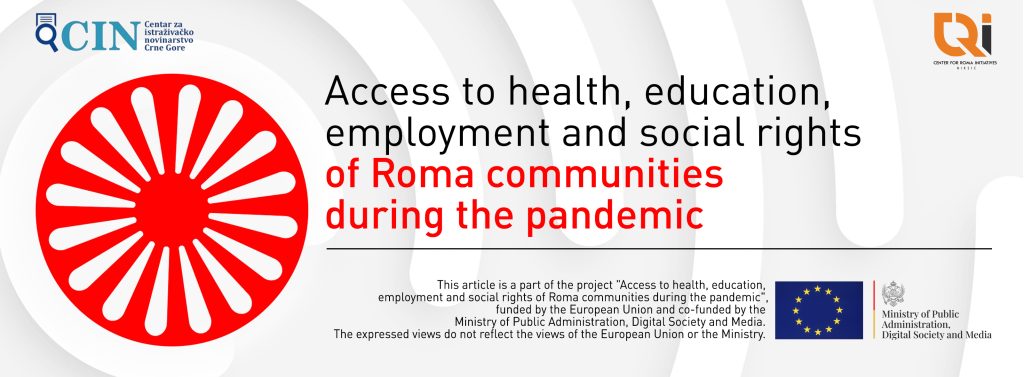DOUBLE DISCRIMINATION REMAINS A PROBLEM IN MONTENEGRO AND THE REGION: LGBT ROMA - INVISIBLE IN THE COMMUNITY

LGBT+ Roma are invisible, and thus their existence is somehow denied both in the Roma and the LGBT+ community, says transgender Roma woman Ana Jovanović. The Draft Law on the Protection of Equality and Prohibition of Discrimination recognizes more severe forms of discrimination, including multiple and intersectional discrimination.
Miloš RUDOVIĆ
Racial discrimination is the first form of discrimination they encounter, and later in life they face discrimination based on sexual orientation or gender identity. This is briefly the experience of Montenegrin and Balkan Roma men and women in the LGBT+ community.
"All this makes it difficult for Roma men and women to fit into a society prone to discrimination, so it very often happens that they have to hide at least one part of their identity and use it as a strategy for survival. LGBT+ Roma are invisible. Thus, their existence is somehow denied both in the Roma and the LGBT+ community," 33-year-old Ana Jovanović, a transgender Roma woman, told the Center for Investigative Journalism of Montenegro (CIN-CG).
The latest European Commission report shows that the Roma and LGBT+, along with people with disabilities, are the most vulnerable groups in Montenegro and that discrimination and hate speech against them are rising. The situation is not much different in the region.
The CIN-CG interlocutor loved to play with dolls, wear her mother's clothes and act like a girl when she was growing up. The mother never had a problem with it, but her stepfather disapproved of it, so she was taught that it was not how boys should behave.
Exactly ten years ago, this now 33-year-old woman from Novi Sad had a traffic accident when she lost her voice due to shock. Her mother noticed that she was becoming depressed and different. In the meantime, as Ana recovered from the accident, they began to talk about her feelings. "Please tell me if you are gay, I know that losing your voice is not just because of the accident," her mother said. Ana replied that she was not gay but a trans woman and her mother accepted her identity.
Although she has the support of her mother, Jovanović is often faced with double discrimination.
"The fact that I am a Roma woman and a transgender person in Serbia is enough to be discriminated in all segments of life: work, housing, health, interpersonal relationships, and the list could go on even further. However, aware of this risk, I took all possible steps to protect myself from discrimination and surrounded myself with people who support me, who come from both the Roma and LGBT+ communities," she said.
Currently, she experiences minor discrimination in the field of employment because she works for a non-governmental organization that deals with the protection of human rights.
"However, when it comes to health and education, I share the fate of every LGBT+ person, except that I have another additional burden: the color of my skin. Therefore, all the problems that come with the transition process and the legal entanglements of changing the name on the degree are absolutely the same, and I experience the same pain as all transgender people in Serbia. Given that I have just entered the transition process and am still waiting for the change of documentation I expect to face more extreme cases of discrimination in future because we live in a transphobic country," she said.
The Ministry of Human and Minority Rights is aware of the increasing presence of homophobia and racism.
"The historical courses of racism and homophobia are quite similar. In both cases, they refer to marginalized groups. As such, they cannot influence the creation of social policies and the improvement of the societal position," the Ministry of Human and Minority Rights responded.
They also added that anti-Gypsyism and multiple discrimination are the main reasons for their social exclusion. In contrast, the reasons for their unfavorable position are high unemployment, low school enrollment, completion rates, and generally poor living conditions.
The Ministry is working on the new Law on the Protection of Equality and Prohibition of Discrimination. The draft of the new Law recognizes more severe forms of discrimination, including multiple discrimination, that is, discrimination against the same person or group of persons on several grounds that can be separated. In addition, intersectional discrimination is recognized, i.e., discrimination against the same person or group of persons on several grounds that interact so that they cannot be separated.
This Draft Law also foresees high penalties for perpetrators of severe forms of discrimination, ranging up to 3,000 euros for individuals and up to 30,000 euros for legal entities.
"We believe that the new Law on the Protection of Equality and Prohibition of Discrimination will be a strong backbone, which will enable us to fight more decisively against all forms of discrimination, and especially against severe forms of discrimination such as multiple and intersectional discrimination," the Ministry stated.
The deputy protector of human rights and freedoms, Nerma Dobardžić Kurti, told CIN-CG were no cases of double discrimination based on belonging to the Roma and Egyptian communities and the LGBT+ population reported to the Ombudsman.
"Members of the Roma community and the LGBT+ community represent one of the vulnerable groups that are most exposed to the risk of discrimination," she said, adding that the latest research by the Center for Democracy and Human Rights (CEDEM) speaks in support of this.
In the research presented in December, it is stated, among other things, that the most common hate speech is against Roma and Egyptians, women, and LGBT+ people.
The NGO Center for the Affirmation of the RE Population (CAREP) executive director, Nardi Ahmetović, told CIN-CG that "the Roma community is highly patriarchal and since discrimination against the LGBT+ community is a taboo, members of the LGBT+ community are afraid to come out. We also believe that some people are members of our organization and the LGBT+ community. As an organization dealing with human rights, we respect and support the struggle of marginalized groups, in this case, the LGBT+ community," he said.
He points out that they have had no complaints or requests for help from Roma who belong to the LGBTIQ+ community.
"We believe that there are people who belong to the LGBT+ community who suffer double discrimination in the mentioned areas," he said, adding that the Roma community respects differences even though "many problems are present within the community."
CAREP points out that they are the only Roma youth organization that voted and supported the "Together for LGBT+ Rights" coalition. Center for Roma Initiatives is also a member of this coalition.
"I believe that soon, this topic will be recognized in the Roma community. Our organization will respect human rights and strive for the Roma community, whether it belongs to the LGBT+ community or not, with all its differences, to be equal in Montenegrin society," Ahmetović said.
Ahmetović also stated that education is crucial, noting that the Roma LGBT+ community is not the only one that suffers double discrimination, but also its persons with disabilities.
"AraArt" is the only non-governmental organization in Europe that exclusively deals with the Roma LGBT+ minority and multiple discrimination.
According to the director of "AraArt," David Tišer, two things need to happen to reduce double discrimination.
"First, intersectional discrimination must be addressed systematically and sustainably. We need to educate people on this topic and make them aware of the different groups of people affected by intersectional discrimination. The second level concerns legislation," Tišer told CIN-CG.
"The Romani LGBT+ minority faces discrimination not only on the part of the majority because of ethnicity or sexual orientation but also on the part of the Roma community, which is very traditional and perceives homosexuality as unacceptable. They are sometimes excommunicated from the family or the whole community. Consequently, they become homeless, stay on their own, without their families and friends," the AraArt website states.
This organization also publishes the stories of LGBT+ people of Roma origin from different parts of Europe. Apart from Jovanovic, the experience of 21-year-old Marko from the Czech Republic is also shared on its website.
"I committed the first attempted suicide at the age of ten. I fell victim to bullying. Not because I am a Roma but because I am gay. Roma is at the fringe of Czech society. Gays are at the fringeof Romany society," he shared his experience.
It is difficult to know if there are such shocking experiences in Montenegro because LGBT+ in the Roma community is still taboo.


